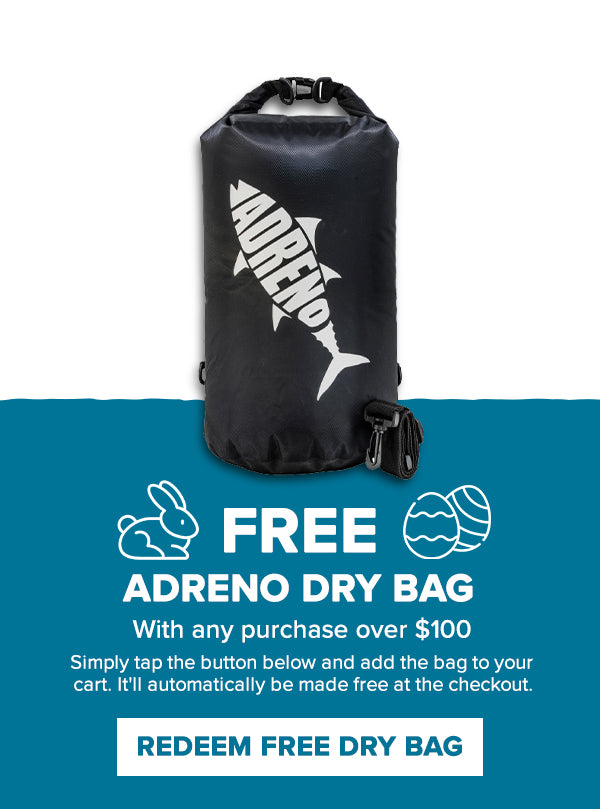Freediving Tips For Beginners By Amber Bourke
June 15, 2021 6 min read

I started freediving in 2011, about 10 years ago now. I was backpacking in Egypt and I ended up in a town called Dahab where it's a super popular thing to do (it's the number one thing to do on TripAdvisor). I had no idea what it was but I'd done a lot of breath-holding before. I was a synchronized swimmer in high school and I've done a lot of snorkeling as a kid and I'd always loved to snorkel, so I was fascinated with what this thing called freediving was.
I basically just signed up for a beginner freediving course and the breath-holding thing came naturally to me. However, I have never been able to equalise my head down. Despite all the snorkeling I’ve done I would always be watching other people dive down into the reef and I would have to stay on the surface.
Enroll in a freediving course
During this beginner freediving course, I learned some more advanced equalization techniques and I learnt how to equalize head down and ever since I've just kept diving deeper and deeper pretty much. So freediving for me has been really great, I had a hip injury when I was a synchronized swimmer - I tore the labrum in my hip and this is an injury that doesn't ever heal. I've had surgery on it but it's something I will have to deal with for the rest of my life. I also have dodgy knees just from a lifetime of too much sport and so for me, freediving, being such a low impact sport, is all about moving really slowly through the water. It's been really great to be able to keep physically active and to keep moving, but also without putting too much pressure on my joints.
But most importantly, it's just been a great way to be part of a like-minded community of people that love being in the ocean and that care for the ocean, so that's my favorite thing about the sport. So definitely my favorite aspect of freediving is the interactions you can have with marine life. You don't have a lot of equipment in freediving, all you really need is a mask and snorkel and a pair of fins and a dive buddy and you're good to go. And because you don't have a lot of equipment, there's not a lot of noise and you can get really up close and personal with marine life and have some really incredible interactions. Some of the best interactions I've had in freediving were in Tonga with humpback whales, they are just so big and so intelligent. It is just incredible to dive with an animal that is so aware of you being in the water with them—definitely an awesome experience!
Is diving with humpback whales scary? No, they're really gentle. I think a lot of people don't realize that we have so many amazing dive sites in Southeast Queensland. In some of my favorite places to dive like Stradbroke Island, we can dive with manta rays and with grey nurse sharks. Also off Moreton Island, there's a great reef called Flinders Reef which is a beautiful coral reef. Those are some of my favorite local dive sites.
My deepest-ever dive was 73 meters. I currently hold four Australian freediving records. I hold three records in the pool— for the furthest distance swam underwater. I also hold the Australian record for the deepest woman to freedive without fins which is 68 meters. This year, I am training for the Australian Pool Freediving Championships, which is going to be held down the Gulf Coast at the end of this year, so that's my immediate goal and that's what I'm training for at the moment.
Think of your long term goals
Long term, I'd really like to get back to another freediving world championship and hopefully get back on a podium - that's my ultimate goal. The Australian freediving championships is a pool competition. It is both static and dynamic, it's about how long you can hold your breath and how many laps underwater in a swimming pool you can swim. Once you get up to a really high level, it helps if you just focus on one discipline, but for the Australian championships we tend to compete in all disciplines because they choose an overall Australian champion. The one with the most number of points combined is the Australian champion, just like in a triathlon. You have to be the best all-rounder.
I currently train two to three days a week in the pool and then two to three days a week in the gym. Freediving is not so great for building up muscle, it's all slow moving in the water. I find it really important to do a bit of gym work to build up a bit of muscle, if you don't have a lot of time to train, I really recommend people focus on getting in the pool. The more time you spend in the water, the more comfortable you are in the water and the stronger a swimmer you are, the easier you will find freediving.
Join a freediving club
I trained with a freediving club. We have two great freeving clubs in Brisbane and it's the best way to train and really the only way to train in freediving because it's really dangerous to hold your breath on your own in the water so you need someone to train with. So if you join a club, there's a lot of people to train with, it's a great social environment. We do all sorts of different training, we do (carbon dioxide) co2 tables and (oxygen) o2 tables, which can be short distance underwater with short rest or longer distances underwater, so there's a whole heap of different techniques you can use to train.
So the best way to get started in freediving is definitely to do a freediving course before you even get out in the ocean, before you create any bad habits, do a freediving course, learn how to freedive the right way from the beginning. A lot of people think they can't hold their breath long enough to do a freediving course. That's not true, everyone can hold their breath long enough to do a freediving course. A beginners freediving course is not about performance, it's not about how long you can hold your breath or how deep you can dive underwater, it's all about learning the right techniques and learning how to dive safely.
If you are training at least once a week, you will see immediate improvement in your freediving, without a doubt. So I teach beginner-level courses all the way through to instructor-level freediving courses and we run a lot of beginner courses. We're running beginner courses every month, so if you want to do a beginner freediving course, contact Adreno - you can also book through the website. So I think a variety of locations across South East Queensland, every dive could be a different location, depending on the conditions, we go to Flinders Reef, Stradbroke, Cook Island off the Gold Coast, and all over the Southeast Queensland.
I started teaching because for me, it was just a way to spend more time on the water and to get out diving and get paid to do it. So I get to go out each weekend and go diving and talk about my passion and get paid doing it - it doesn't get much better than that! I was born and grew up in Brisbane and Adreno has been here for as long as I can remember. I bought my first freediving fins from Adreno in 2011, 10 years ago now and since then, their freediving range has just continued to grow. You can do your course at Adreno and then get all the free diving equipment you need at Adreno, and then when you want to upgrade, you can upgrade some more advanced equipment. It's locally available, it's massive, it has everything you need. For me it's been a great opportunity teaching at Adreno.


